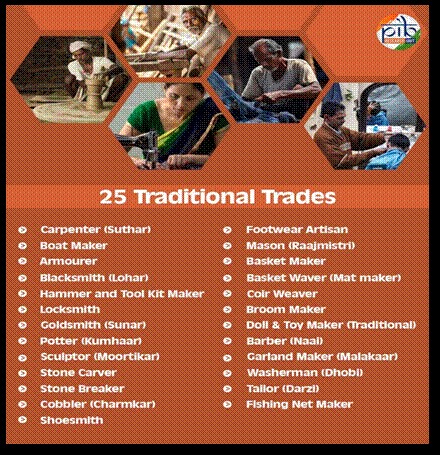PM Vishwakarma Yojana

- 08 Nov 2024
In News:
The PM Vishwakarma Yojana is a landmark initiative by the Indian government aimed at revitalizing traditional craftsmanship and empowering artisans and craftspeople, often referred to as Vishwakarmas. Launched on September 17, 2023, during Vishwakarma Jayanti, the scheme highlights the government's commitment to preserving India's rich cultural heritage and supporting the unorganized sector.
Key Highlights
- Objective:
- To strengthen the Guru-Shishya tradition and improve the quality, reach, and marketability of products and services by artisans.
- To integrate Vishwakarmas into domestic and global value chains, making them self-reliant.
- To alleviate poverty by supporting rural and urban artisans across India.
- Financial Outlay:,Fully funded by the Union Government with a ?13,000 crore budget spanning five years (2023–2028).
- Eligibility:
- Open to rural and urban artisans and craftspeople involved in 18 traditional crafts, such as blacksmithing, goldsmithing, pottery, boat making, and carpentry.
- Covers 5 lakh families in the first year and aims to reach 30 lakh families over five years.
- Key Benefits:
- Financial Support:
- Collateral-free credit of ?1 lakh (first tranche) and ?2 lakh (second tranche) at a concessional 5% interest rate.
- Government provides 8% interest subvention upfront to banks.
- Toolkit Incentive: ?15,000 via e-vouchers for acquiring modern tools.
- Training and Skill Development: Basic and advanced skill training to create industry-ready manpower.
- Digital and Marketing Incentives: Encourages digital transactions and provides marketing support.
- Recognition: Beneficiaries receive a PM Vishwakarma Certificate and ID Card.
- Market Linkage: Facilitates better market access for artisan products.
- Financial Support:
- Achievements (as of Nov 4, 2024):
- 25.8 million applications received.
- 2.37 million artisans registered after verification.
- Over 1 million artisans benefited from toolkit incentives.
Significance
- Promotes inclusive development by supporting an underserved segment of the workforce.
- Recognizes and supports traditional skills passed down through generations, preserving India’s cultural diversity.
- Enhances productivity and competitiveness by integrating artisans into MSME sectors.
- Encourages sustainability through the promotion of handmade, eco-friendly crafts.
Key Institutions Involved
- Ministry of Micro, Small, and Medium Enterprises (MSME): Oversees implementation.
- Common Services Centres (CSC): Facilitates registration through biometric-based PM Vishwakarma Portal.
Challenges Addressed
- Lack of access to modern tools and financial support.
- Insufficient market linkages and exposure for traditional crafts.
- Limited opportunities for skill enhancement and product development.
